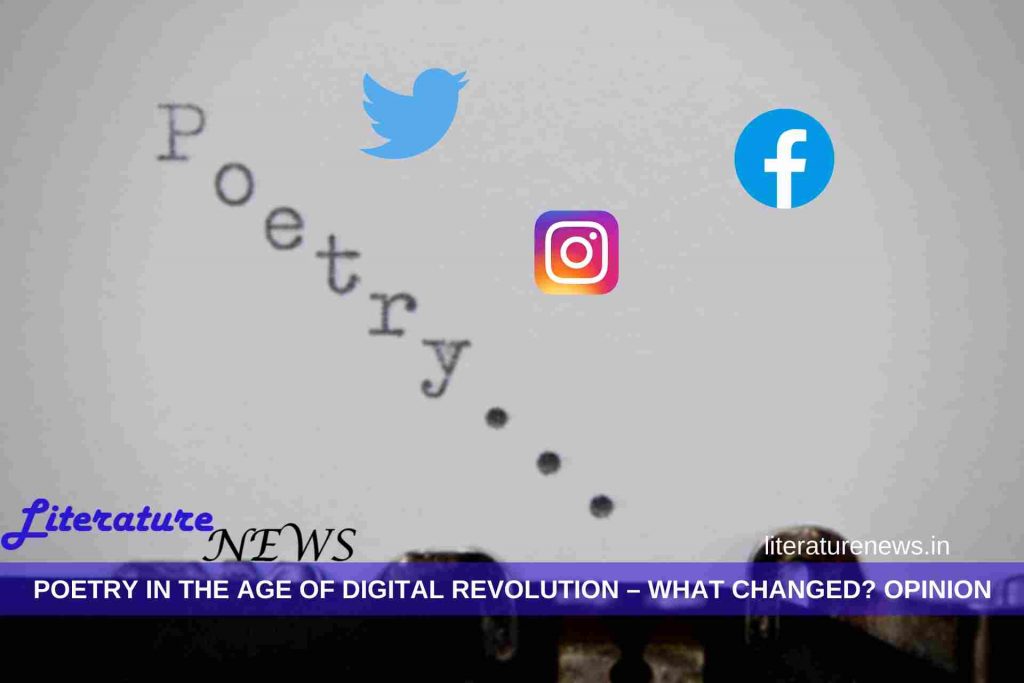Do you use Instagram? If you are under-30 and you use the internet on your mobile phone, there is 93.76% possibility that you must be using Instagram – maybe less frequently but you use it. And, if you are one of the many users of this platform, you must have seen a few posts with poems and images (some lines written in verse or, at least, seemingly so) when you browse random photos of the people you follow. Likewise, you must have seen some poems by new-age digital poets on Twitter and on Facebook as well. This is a good and a very new trend that has emerged in the past decade with the rise in the global power of internet connectivity where a critic sitting in Ireland can commend on a poem posted by someone in Nepal. Isn’t that a good thing? However, is this new power good for poetry itself?
Poetry has been there in all the ages. Poetry has been there for centuries and decades and years and days. We may have been walking on four feet or we could be having our raw meats (as science claims), poetry was there in its distinct form and it has evolved very much in line with our evolution – from cave arts to the arts on the pages by William Blake or from the writings on Tamrapatra to the creation of Ramacharitmanas by Goswami Tulsidas… poetry has been the part, a very essential part, of our journey on the lane of evolution. And today we have reached the age of digital revolution (just keep aside corona for the sake of aesthetical enhancement of this article) when composing a poem is a task of seconds, not even minutes, and posting it online and getting feedbacks of the readers is too easy – just without any trouble. What does it hold in the pack for poetry? What shall poetry get out of the 6-inch and more than that size screens?
Poetry on the internet comes with many surprises. Sometimes, which happens rarely, you can see creativity at its peak by some random poet. You may be enchanted by the quality of the verse and the arrangement of words; wow! You will certainly utter this word. However, most of the times and it’s totally normal, you will find just absurdity and confusion in the name of poetry that is served to the users of the internet or the readers of digital poetry today. And, not surprisingly, most of the poems are about love (which is miles away from the original or the standard idea of love), break-up, heart, broken heart, lust, kiss, and anything and everything around the idea of love. Is that normal? Yes. Was this expected if everyone is given a poetic license to fire out their emotions and thoughts? Yes. Is it serving poetry in any way? NO!
Irrespective of language and style of expression or the country of production, things like Instapoetry and TwitterPoems are only bringing confusion to the minds of the poetry lovers. For example, a teenager who has just started to enjoy poetry in his academic life might be interested in knowing more about poets and poetry online. He might be on Instagram and Twitter and Facebook etc and it’s natural that our guy would like to ‘meet’ or see or get introduced to some of the poets on these platforms. However, there is a very high probability that our guy will end up meeting and knowing very mediocre or just say unpoetic poets online and all the taste for poetry that he might have made in his mind after reading Keats or Wordsworth, Agyeya or Dinkar, or any POET in any language will just fade away and eventually replaced by something like:
“If I don’t see you,
believe me, I am saying true,
I will, very soon, die!
And darling, trust me, I don’t lie!”
Or something like this in case of Hindi poetry:
“तुम्हें चूमना मेरे होठों की चाहत है,
तुम्हें सजदा करूँ क्यूंकि तू मेरी इबादत है,
खुदा तो बस तेरा अक्स है अब
क्यूंकि तुम हो तो सब है वर्ना कहाँ मुझे खुशियों की आदत है?”
I can sense there are many boiling heads right now! Yes, this is what forms 90% of “POETRY” that we consume online, instantly, quickly and without thinking anything. Those who are experts and who know what real poetry should be can easily pass this troublesome phase. However, those who have just begun building up their taste for poetry might spoil everything even before it begins! Should we allow this to happen? Well, what can we do? The internet is a free wishlist and we have so many well-wishers of poetry available to let the lot sink… welcome to the interment of poetry!
And to all the poets of Instagram, Facebook and Twitter – dear poets, it’s a big thing to be called or to call oneself a poet. You have a big responsibility that, even you are unwilling, you have to carry on your shoulders. You should think many times before mistaking personal whims and tragedies for poetry. Yes, that can be a part of your process to build poetry but that CANNOT be poetry! With this distinction, you can certainly make yourself the flagbearers of poetry in this digital age and that will be real service to the poetry community worldwide.
However, let us not forget that digital revolution and suddenly emerging self-publishing companies in India have helped bring some of the best poetic talents in India in front of the world. I am not denying that digital freedom gives everyone the right to write and propagate anything unless it doesn’t harm anyone. However, at the same time, with all these publishing and promotion tools that we have, we should, rather must, be very cautious with what we promote and what content we offer to the readers on the internet.
Opinion by Alok Mishra for Literature News
